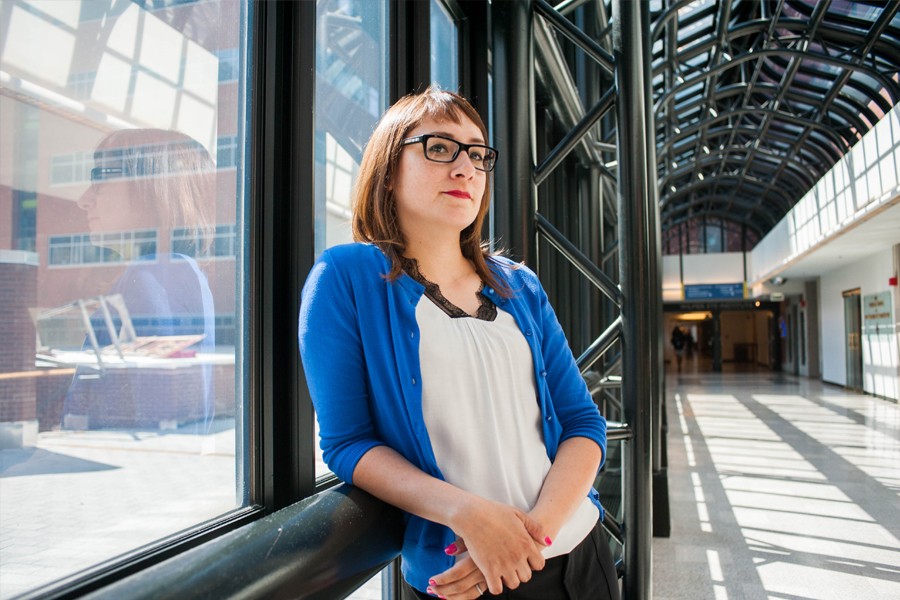Like many who work at Johns Hopkins, Rachel Salas has a career where medicine and education have overlapped. She's a neurologist who treats and studies sleep disorders, and she also teaches courses in the School of Medicine.
But when her work took her deeper into the education side—developing an academic medicine program for pre-meds and directing the Core Clerkship in Neurology—Salas says she found herself wanting more-formal training and expertise.
A few years ago, she found a program right at Johns Hopkins that aligned with those goals: the Master of Education in the Health Professions.
The MEHP—a collaboration of the schools of Business, Education, Medicine, Nursing, and Public Health—is designed for experienced health professionals with master's or doctoral degrees. That could include physicians, nurses, public health faculty, dentists, and pharmacists.
The degree program helps these professionals advance in educator roles, through "an approach that treats teaching as scholarship," says Toni Ungaretti, MEHP director and assistant dean at the School of Education. The underlying goal, she says, is "to prepare leaders and change agents who transform health professions education across the globe."
Ungaretti says that MEHP graduates tend to be recognized names in their fields, publishing in highly regarded journals and moving up to top leadership positions.
Salas, who has worked on education issues at the national level through the American Academy of Neurology, says the MEHP responds directly to the recent progression of the "medical educator" track, as top positions become increasingly competitive.
"The days of 'you are good with students and like to teach' are over when selecting people to be in educational leadership roles, such as clerkship or program directors," she says. "Nowadays, faculty interested in medical education are looking for more-formal training to better connect with their adult learners."
Martha Kennedy, the director of clinical education in the Department of Surgery at the Johns Hopkins Hospital, recognized the degree as a chance to boost her expertise. While she had served in various teaching and mentoring roles throughout her nursing career, she felt her degrees hadn't sufficiently prepared her for that dimension of her work.
"Although I was a good teacher, I wasn't up-to-date on the proven approaches for creating great learning experiences," says Kennedy, who is also an instructor in the School of Medicine's Department of Anesthesiology and Critical Care Medicine.
The MEHP, offering online courses taught by multidisciplinary faculty teams, begins with an 18-credit core in evidence-based teaching, focusing on strategies and theory along with curriculum development. Participants then choose specializations in either educational research or educational leadership, receiving mentoring support for a final publishable capstone project.
Although the program has drawn attendees from such institutions as McGill, Stanford, Weill Cornell, and the Mayo Clinic, to name a few, Ungaretti says that each year it also attracts a substantial cohort of Hopkins physicians, nurses, and public health faculty, who have the added bonus of tuition assistance.
The online format and ability to set one's own pace also appeal to busy professionals who are already working in demanding jobs.
As a full-time associate professor, Salas says she initially feared she wouldn't have time for another degree, but after seeing other educators at Johns Hopkins pull off the MEHP, "I figured, what the heck, I can make it work." She's currently in her final semester, after starting in fall 2013.
Neurologist Roy Strowd, an adjunct professor in the Department of Neurology at Johns Hopkins, says he's been able to fit in one class per semester, aiming to complete his degree within four years.
"I don't have to drop all of the other things I'm doing," he says of this flexibility.
For Strowd—who had a grant for medical education training while he completed a fellowship at Hopkins, and has worked with Salas on developing curriculum for the Neurology clerkship—the goal was to take his teaching knowledge above and beyond the classroom.
"Before, I could teach and did a reasonably good job in front of the students," he says, "but the MEHP has taken me to a place where I can look at guiding education on a higher level—through course design, curriculum development, and education research."
Kennedy says that beyond giving her new tools for education practice and leadership, the MEHP offers value in the variety of perspectives that come from attendees across the globe, who interact online. "The mix of people both geographically and by practice is incredibly beneficial," she says.
With all of these different contexts—"community hospitals, academic hospitals, universities, Europe, Canada," Kennedy rattles off—"your assumptions about the way things work automatically change."
Posted in News+Info, Benefits+Perks, Tools+Tech








